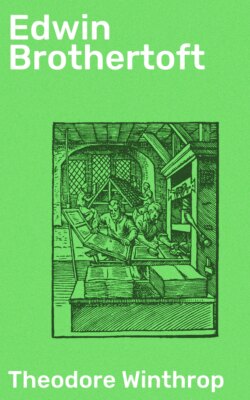Читать книгу Edwin Brothertoft - Theodore Winthrop - Страница 4
Chapter II.
ОглавлениеBluff is the bow and round as a pumpkin is the stern of the Dutch brig, swinging to its anchor in the bay of New York. It is the new arrival from England, this sweet autumn day of 1665. The passengers land. Colonel Brothertoft and family! Welcome, chivalric gentleman, to this raw country! You and your class are needed here.
And now disembark a great company of Lincolnshire men, old tenants or old soldiers of the Colonel’s. Their names are thorough Lincolnshire. Here come Wrangles, Swinesheads, Timberlands, Mumbys, Bilsbys, Hogsthorpes, Swillingores, and Galsworthys, old and young, men and women.
These land, and stare about forlornly, after the manner of emigrants. They sit on their boxes, and wish they were well back in the old country. They see the town gallows, an eminent object on the beach, and are taught that where man goes, crime goes also. A frowzy Indian paddles ashore with clams to sell; at this vision, their dismayed scalps tremble on their sinciputs. A sly Dutchman, the fatter prototype of to-day’s emigrant runner, stands before them and says, seductively, “Bier, Schnapps!” They shake their heads firmly, and respond, “Nix!”
Colonel Brothertoft was received with due distinction by Governor Nicolls and Mayor Willet. Old Peter Stuyvesant was almost consoled that Hollanders were sent to their Bouweries to smoke and grow stolid, if such men as this new-comer were to succeed them in power.
The Colonel explored that “great brave river” which Connecticut Winthrop had celebrated in his letter. Its beautiful valley was “all before him where to choose.” Dutch land-patents were plenteous in market as villa sites after a modern panic. Crown grants were to be had from the new proprietary, almost for the asking.
The lord of old Brothertoft Manor selected his square leagues for the new Manor of Brothertoft at the upper end of Westchester County, bordering upon the Highlands of the Hudson. A few pioneer Dutchmen—De Witts, Van Warts, and Canadys—were already colonized there. His Lincolnshire followers soon found their places; but they came from the fens, and did not love the hills, and most of them in time dispersed to flatter country.
The new proprietor’s wealth was considerable for America. He somewhat diminished it by reproducing, as well as colonial workmen could do, that corner of the old manor-house untouched by the fire. It grew up a strange exotic, this fine mansion, in the beautiful wilderness. The “curious fabrick” of little imported bricks, with its peaked turret, its quaint gables, its square bay-window, and grand porch, showed incongruously at first, among the stumps of a clearing.
And there the exiled gentleman tried to live an exotic life. He bestowed about him the furniture of old Brothertoft Manor. He hung his Vandyck on the wall. He laid his presentation copy of Mr. John Milton’s new poem, Paradise Lost, on the table.
But the vigor and dash of the Colonel’s youth were gone. His heart was sick for the failure of liberty at home. The rough commonplace of pioneering wearied him. He had done his last work in life when he uprooted from England, and transferred his race to flourish or wither on the new soil. He had formed the family character; he had set the shining example. Let his son sustain the honor of the name!
The founder of Brothertoft Manor died, and a second Edwin, the young Astyanax of Vandyck’s picture, became the Patroon.
A third Edwin succeeded him, a fourth followed, and in 1736 the fifth Edwin Brothertoft was born. He was an only child, like each of his forefathers. These pages chronicle his great joy and his great sorrow, and how he bore himself at a crisis of his individual life. Whoever runs may read stories like his in the broad light of to-day. This one withdraws itself into the chiaroscuro of a recent past.
The Brothertoft fortunes did not wax on the new continent. Each gentle Edwin transmitted to his heir the Manor docked of a few more square miles, the mansion a little more dilapidated, the furniture more worn and broken, the name a little less significant in the pushing world of the Province.
But each Edwin, with the sword and portrait of the first American, handed down the still more precious heirlooms of the family—honor unblemished, quick sympathies, a tender heart, a generous hand, refinement, courtesy—in short, all the qualities of mind and person that go “to grace a gentleman.”
It became the office of each to be the type gentleman of his time.
Perhaps that was enough. Perhaps they were purposely isolated from other offices. Nature takes no small pains to turn out her type blackguard a complete model of ignobility, and makes it his exclusive business to be himself. Why should she not be as careful with the antagonistic order?
The Brothertofts always married women like themselves, the female counterparts of their mild manhood. Each wife blended with her husband. No new elements of character appeared in the only child. Not one of them was a father vigorous enough to found a sturdy clan with broad shoulders and stiff wills, ordained to success from the cradle.
They never held their own in the world, much less took what was another’s. Each was conscious of a certain latent force, and left it latent. They lived weakly, and died young, like fair exotics. They were a mild, inefficient, ineffectual, lovely, decaying race, strong in all the charming qualities, feeble in all the robust ones.
And now let the procession of ancestors fade away into shadows; and let the last shadow lead forth the hero of this history in his proper substance!
